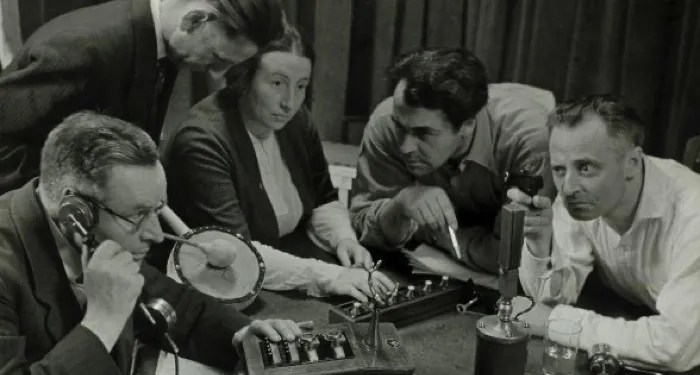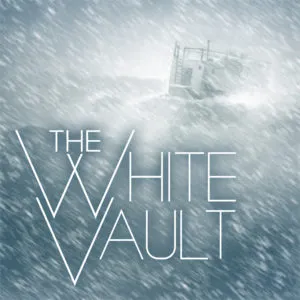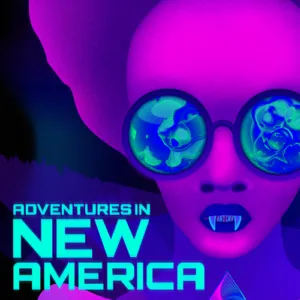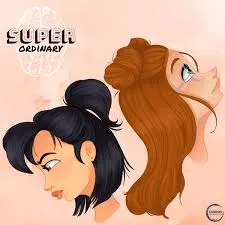
Radio Drama: Then And Now
This content contains affiliate links. When you buy through these links, we may earn an affiliate commission.
The definition of audio drama from Wikipedia goes as follows: “Radio drama (or audio drama, audio play, radio play, radio theatre, or audio theatre) is a dramatised, purely acoustic performance. With no visual component, radio drama depends on dialogue, music and sound effects to help the listener imagine the characters and story.”
I started to listen to radio dramas even before audiobooks; actually, radio dramas were the bridge I needed to cross to start appreciating audiobooks, and I’m immensely grateful that they have taught me to pay attention when listening seemed like a secondary task to me, something that I did while doing something else. Granted, to this day I still find it hard to just sit and listen, I usually go through my audiobooks, podcasts, or radio dramas while doing chores, or crafts, but while this seems like no big deal, being able to listen even while keeping myself busy was a battle won, as my mind always had a tendency to wander.
Radio drama, with its different voices and sounds, projecting a similar atmosphere to that of a movie, kept me focused long enough to teach me some hearing discipline.
While listening to radio dramas may seem like something outdated, radio was the machine that turned oral stories – often told inside one family – to a magical form of entertainment for a whole population. Before video, before TV, radio dramas were the place where stories, more than just being read, took form.
“The White Vault features an international cast and brilliant sound design.
If you like how sound can add creepiness and ambience to your horror, you will love what this audio drama does with it.”
—Vernieda Vergaras
Both are BBC Radio 4 productions and both are brilliantly made.
With a fantastic cast, Gaiman’s (and Pratchett, in the case of Good Omens) wonderful stories really come to life in this production.
Gaiman has seen other of his books adapted for radio, but these are still my personal favourites.
Another sci-fi drama, this time in the genre of Afrofuturism.
Its two main characters – “fat, lonely curmudgeon IA and lesbian sneak-thief Simon Carr”, as described on the official site – hustle around New York City trying to make ends meet.
They end up having to face a few unexpected enemies on the way to achieve their goals.
Anika is a young woman with super-powers. The only issue is that her superpowers only manifest when she has a panic attack.
If she thought trying to control her mind was difficult, the fact that she can’t now control her mind or super-powers gives her some extra trouble to deal with.
With the help of her best friend, Anika tries to let herself and her story be heard.
If you enjoyed this article and you’d like to learn more about audio drama, here are a few links you will find useful! Fiction Podcasts To Satisfy Your Love For Stories More Fiction Podcasts To Satisfy Your Love For Stories Fiction Podcasts For Superhero Fans
In the Beginning There Was…The Theatrophone!
In the 1940s, all the way to the 1950s, radio was the major popular entertainment. It was more than just a source of news: music and novels were also a major part of people’s everyday lives. In many ways, when people lived closed in inside their own community, radio must have felt like the only direct thing connecting a whole family to those who lived far apart, to the country they lived in and the unknown (rest of the) world. This was true until at least the 1950s, and the only reason radio lost its big appeal was because it was, in a sense, substituted with something that looked a bit more like magic: the television. No matter how cool it was to listen to someone speak from many many miles away, nothing could beat the new enchantment created by the magical little box with tiny people trapped inside it. But while TV became widely popular, radio was the first to start a widespread broadcast of theatre plays, most of them adapted to radio. Eventually, because it was difficult to make this adaptation, since theatre plays relied heavily on what the audience was seeing, many plays started being written specifically for radio broadcasting. This meant that with the help of sound effects – usually created with the most common objects and a lot of imagination – the listeners had the full experience of a play, made for their ears only.The First Radio Dramas
The first play written specifically for radio was A Comedy Of Danger, by Richard Hughes, which aired in January of 1924, commissioned by the BBC in Britain. In the U.S., it is believed that the first radio drama was a show called The Wolf, adapted from a play of Charles Sommerville by Eugene Walter, also in 1924. But radio dramas have their roots set in another type of broadcasting, way before the technology for radio was developed. Between 1900 and 1920 people used a network of lines to listen to live performances – this was called the théàtrophone. Basically, the equivalent of placing a glass against your neighbour’s walls to listen to them play the piano (or to spy on their own personal dramas). Of course, théàtrophone was better set up, had better sound quality, and was less inconspicuous (and rude). It did, however, allowed people to listen to things they’d otherwise have no means to listen to. Also, here’s a little nugget of knowledge which proves, once again, that times and technologies change, but people pretty much remain the same: as new plays started being written for radio, and others adapted, many claimed that radio was ruining theatre sales. And boy, they were angry about it. Little did they know that both theatre plays AND radio would be amusing us to this day still. Most dramas from the Golden Age of radio were live shows, and they were not recorded. In fact, until the late 1940s the national networks prohibited the airing of recorded programmes due to its inferior sound quality. Only after the Second World War, with the development of high-fidelity, recording became more common.On Air…Panic! How Orson Welles Created a Radio Legend
The story of The War Of The Worlds first appeared in two magazines in 1897: Pearson’s Magazine (in the UK), and Cosmopolitan (in the U.S.). It became an actual book by the hands of the publisher William Heinemann a year later, in 1898. The science fiction novel, written by H.G. Wells, is one of the first to imagine a struggle between humans and aliens invading Earth. In 1938, on the evening of 30 October, the radio adaptation was broadcasted live as part of The Mercury Theatre On The Air, narrated by Orson Welles. It could have been yet another adaptation, another radio drama broadcast, but it is now etched in the history of radio drama forever. The original story takes place in England, but playwright Edward Koch decided to make the setting more appealing for American listeners, and changed it to take place in New Jersey. Everyone involved in the production agreed that the first part of the adaptation would be made to resemble a news broadcast, in order to sound more realistic. With the brilliant interpretation of Orson Welles, and the great work of the production team, which managed to create what resembled a regular radio broadcast interrupted here and there with news bulletins, they got exactly what they bargained for. And then some. Those at home who missed the opening announcement, which contained the only warning that it was a fictional radio play, believed that the things being narrated were actually happening and took to the streets in panic. Had they stayed for the second half of the drama, which was broadcasted in a more conventional style, they’d realise how foolish they had been. People got so angry at the repercussions of the play – and, I bet, for being taken for fools, bless them – that the Federal Communications Commission had to make changes regarding the way broadcasters clarified the veracity – or fiction – of their radio dramas. Emphasis on drama. Later, while being interviewed about the panic the broadcast had caused, Welles was asked if he shouldn’t have toned down the language of the drama, to which he replied: “No, you don’t play murder in soft words.” High praise to our man Welles. Of course, as we hear this story, we’d like to believe we are wiser and more informed these days, but with all of the fake news spreading around, we should all be ready to humbly get off our high horses. Metaphorically speaking, that is. Many of the recordings broadcast during the so-called Golden Age of radio are available on the Internet Archive still to this day. A few known classics, besides The War Of The Worlds, are:The Shadow
Serialised dramas from the 1930s, developed by Walter B. Gibson, some episodes also included Orson Welles.Lone Ranger
If Chuck Norris as Walker, Texas Ranger had a radio series, this would be it. It inspired a TV show, and even a series of books. Its creator is unclear, being attributed either to George W. Temble (the owner of the radio station), and Frank Striker (the writer).The Archers
The world’s longest-running radio drama is BBC Radio 4’s The Archers, released for the first time in 1951, and still going strong. (A personal thought: I see a lot of male names connected to the creation of radio drama, so when someone comes at you saying that women start all the drama, kindly redirect them to this post.)Radio Drama In The Current Times
Despite what many may have predicted when television started to take over the entertainment industry, radio drama seems to be making a steady come back in the last decade or so, especially through the voices of independent creators. While our parents are still mostly used to listening to the radio, younger generations are now listening to podcasts, and that brings the advantage that we can actively choose what we listen to, and which matters should be worthy of our attention. Audio isn’t just a way of entertainment anymore, but a new way to learn, to keep up with the news and, many times, to advertise and expand a business. Although the UK’s BBC is still the biggest audio drama provider – at least stationwise, with BBC Radio 4 producing several drama and comedy shows and even hosting audio awards – radio drama isn’t anymore merely transmitted through the customary radio stations: there are currently whole teams creating them, and keeping them going season upon season with the help of their admirers, inviting them to support their work via Patreon, or such similar means. One example of this is Wooden Overcoats, a radio drama featuring two competitor funerary homes in a small (fictional) island. The production – which is a comedy and well worth a listen – is set to record its fourth series this year, and while not being broadcast by any public radio station, has seen their fans supporting them massively (and economically) season after season since it first started in 2015. Welcome To Night Vale is another instance in which an independent radio drama swept an audience off its feet, and it has been booked for 50 live shows across the U.S. and Europe in 2020 alone. Because these are independent productions, they have more liberty to try different things, and are more focused on what their fans expect from the show. The continuation or cancellation of these shows is determined directly by their listeners, rather than depending on a radio station’s agenda. Of course, one of the reasons audio entertainment has become so popular is due to the fact that it is now easier than ever before to acquire the necessary material to start an audio production. Even people with a very limited budget can make a podcast from scratch from their homes and succeed. With only a laptop and a microphone, you’re good to bring to life great audio content from the commodity of your house. There are free programmes like Audacity which allow you to record, erase, and move around bits of audio to create a flawless recording capable of engaging thousands of people. The possibilities go as far as creativity can stretch. With the tools we now have available – phones with great cameras and good technology getting cheaper and more widely available – such productions could very easily be made in video form, but there’s a lot of advantages to choosing to produce – and – consume audio instead of video: audio is easier to record and edit than video, and it requires less storage space. It is also a lot cheaper to create a whole production based on sound effects alone than it would be to create anything to tell the same story in video: props, set, and costumes are a lot of work and, mostly, a big expense. For consumers, audio doesn’t demand as much attention and it doesn’t claim as much of our time: with audio we don’t need to sit and stare. Radio drama allows us to be productive while we consume it, and it can even be used as a complement for chores, and the other way around. My chores, commuting, and exercise practice have become much more interesting since I’ve discovered radio drama and audiobooks, because it now means that I can also get some reading/learning done. I’m taking as much time to do chores as I am to finish listening to my favourite book, TED Talk, or radio comedy. I’m being productive in two ways, and whatever task I have at hand becomes lighter because I have something to entertain me while I do it. Audio keeps me going on the go. On top of this, it doesn’t really require a fancy device in order not to compromise quality: I still use a second-hand iPod touch 5th generation, from 2012, and it works just fine, but I could very easily just listen to anything on my phone. We can’t know for certain how audio drama, and audio entertainment in general, are going to evolve in the next decade, but the studies point out to an increase in audiobook consumption, so it is expected that audio drama numbers, and productions, will continue to escalate in much the same way. via GIPHYListen to These Radio Dramas
If you’re looking to fill your life with some more radio drama, here are a few favourites! The White Vault
The White Vault
“The White Vault features an international cast and brilliant sound design.
If you like how sound can add creepiness and ambience to your horror, you will love what this audio drama does with it.”
—Vernieda Vergaras
The Bright Sessions
“The Bright Sessions was one of my first experiences with audio drama and the reason I am such an avid listener of fiction podcasts now. The characters and their stories have meant so much to me in my own journey with identity, mental health, etc. over the years, and it remains my forever favourite.” —Patricia Thang Neverwhere and Good Omens
Neverwhere and Good Omens
Both are BBC Radio 4 productions and both are brilliantly made.
With a fantastic cast, Gaiman’s (and Pratchett, in the case of Good Omens) wonderful stories really come to life in this production.
Gaiman has seen other of his books adapted for radio, but these are still my personal favourites.
Cabin Pressure
First broadcast on BBC Radio 4 in 2008, the series came to worldwide attention with the boom created by Benedict Cumberbatch and his BBC Sherlock. Benedict is part of the cast alongside Roger Allam, Stephanie Cole, and John Finnemore, who is also the show’s writer. The series is still my favourite to this day; it’s incredible to see the evolution of each character across all four seasons, and it (still) cracks me up every time I re-listen. Which I have done countless times.Wolf 359
Similar to the traditional dramas of the Golden Age of radio mentioned in the article, this podcast is a sci-fi tale which takes place on board of the U.S.S. Hephaestus space station. The show relies so much on their character development, as on their setting, to create a story filled with suspense. Adventures In New America
Adventures In New America
Another sci-fi drama, this time in the genre of Afrofuturism.
Its two main characters – “fat, lonely curmudgeon IA and lesbian sneak-thief Simon Carr”, as described on the official site – hustle around New York City trying to make ends meet.
They end up having to face a few unexpected enemies on the way to achieve their goals.
Moonface
With a coming out story at the centre of its plot, this will hit especially close to home for the kids of emigrants who struggle to figure out where they belong amongst the various cultures they grew up with. The main character, Paul, wants to open up about his sexuality to his mother, but she doesn’t speak English and he doesn’t speak Korean. It’s a tale of identity, in its various forms. Super Ordinary
Super Ordinary
Anika is a young woman with super-powers. The only issue is that her superpowers only manifest when she has a panic attack.
If she thought trying to control her mind was difficult, the fact that she can’t now control her mind or super-powers gives her some extra trouble to deal with.
With the help of her best friend, Anika tries to let herself and her story be heard.
If you enjoyed this article and you’d like to learn more about audio drama, here are a few links you will find useful! Fiction Podcasts To Satisfy Your Love For Stories More Fiction Podcasts To Satisfy Your Love For Stories Fiction Podcasts For Superhero Fans


